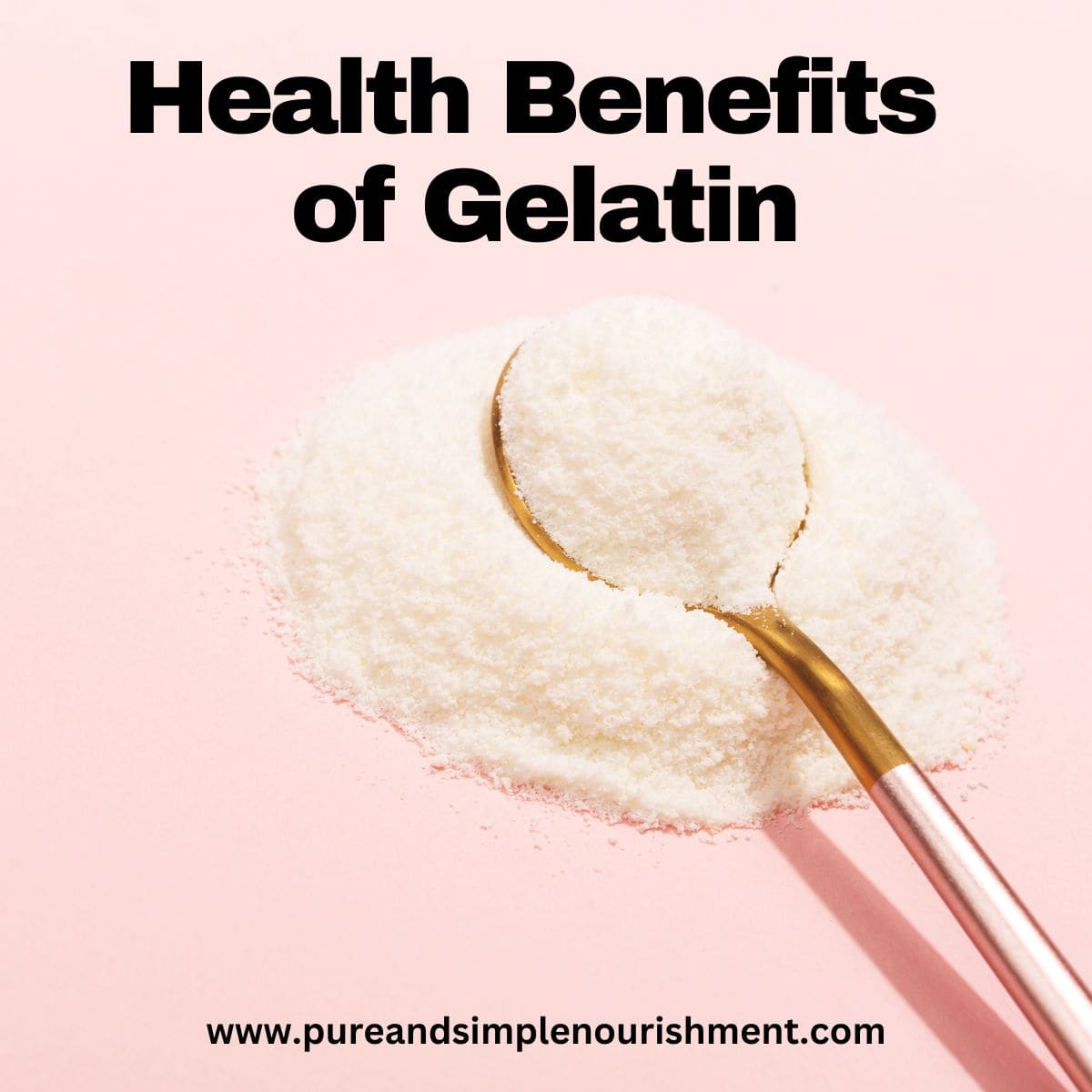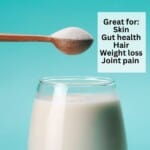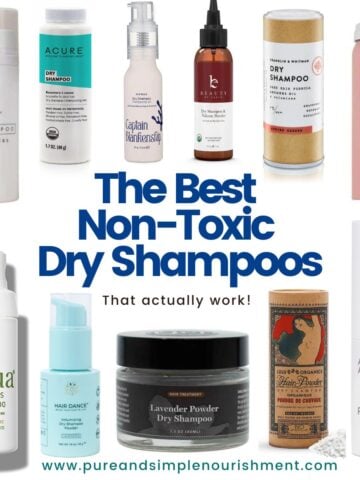This post reviews the many different health benefits of gelatin including helping with the pain of osteoarthritis, improving gut health, nails, hair and skin.

Disclaimer: some of the links in this post are affiliate links whereby I make a small commission if you purchase the product through that link. This does not cost you anything extra and helps me to keep this website running.
Note, the information in this post is not to be taken as medical advice. Always check with your own doctor or health care practitioners before making any diet or supplement changes.
Table of Contents
What is gelatin?
Gelatin is a protein derived from cooking collagen. It is made almost entirely of protein, and its unique amino acid profile leads it to have many health benefits.
Collagen is the most abundant protein found in humans and animals. It is found almost everywhere in the body, but is most concentrated in the skin, bones, tendons and ligaments. Collagen provides strength and structure for tissues. For example, collagen increases the flexibility and durability of the skin and the strength of the tendons.
However, it can be difficult to eat collagen because it is usually found in the more unpalatable parts of animals. Fortunately, collagen can be extracted from these animal parts by boiling them in water. This is what you do when you make soup stock or bone broth for example. The gelatin extracted during this heating process is flavourless and colourless. It dissolves in warm water, and takes on a jelly-like consistency when it cools.
This has made gelatin useful as a gelling agent in food production, and is used in products such as Jell-O and gummy candies. It can also be consumed as bone broth or as a supplement.
Gelatin can be processed further to produce a substance called collagen hydrolysate (also known as collagen peptides), which contains the same amino acids as gelatin and has the same health benefits. However, the advantage of collagen is that it dissolves in cool liquids and doesn’t form a jelly or gel. This makes it easier to use.
Both gelatin and collagen hydrolysate are available as supplements. You can find gelatin capsules and collagen in powder or granule form. Gelatin can also be purchased in sheet form. Just note that because they come from animals, collagen and gelatin are not suitable for vegans.
Gelatin is a source of protein
Did you know that gelatin is mainly protein? In fact, gelatin is 98-99% protein. However, it is an incomplete protein because it does not contain all the essential amino acids. Specifically, gelatin does not contain the amino acid tryptophan. This means that you can't rely solely on gelatin as your only source of protein.
The concentration of amino acids in gelatin sourced from mammals is:
- Glycine: 21%
- Proline: 12%
- Hydroxyproline: 12%
- Valine: 14%
- Glutamic acid: 10%
- Alanine: 9%
- Arginine: 8%
- Aspartic acid: 6%
- Lysine: 4%
- Serine: 4%
- Leucine: 3%
- Valine: 2%
- Phenylalanine: 2%
- Threonine: 2%
- Isoleucine: 1%
- Hydroxylysine: 1%
- Methienine: 1%
- Histidine: 1%
- Tyrosine: < 0.05%
Important to note, gelatin is the richest food source of the amino acid glycine, which is important for your health and has been shown to decrease inflammation.
It's also important to recognize that gelatin is not a good source of vitamins or minerals. Rather, its health benefits are mainly the result of its unique amino acid profile.
Health Benefits of Gelatin
1. Improves gut health
In fact, gelatin administration has been shown to help treat colitis in animal models of IBD (reference) and it has been shown to help decrease intestinal permeability in humans as well (reference; reference).
Animal studies have also shown that gelatin supplementation can help prevent gastric ulcers and improve the integrity of the intestinal lining.
There is also evidence that collagen or gelatin can help with acid reflux (GERD) which is a common digestive issue.
2. Can help treat arthritis pain
If you guys didn't know I am a rheumatologist. That means I see a ton of patients with arthritis. I am constantly on the lookout for natural treatments that can help my patients, and I am pleased to say that collagen or gelatin is one natural remedy that has been shown to have beneficial effects for patients with osteoarthritis. There is evidence that taking collagen can improve the pain associated with osteoarthritis. It has also been shown to decrease joint pain in athletes.
When it comes to rheumatoid arthritis, the data is not as clear. Whether or not collagen is effective for rheumatoid arthritis remains controversial.
3. May help with weight loss
Gelatin is both low in carbs and low in fat and depending on how it's made it can also be low in calories.
Studies have shown that gelatin may even help with weight loss. In one study, subjects were given 20 grams of gelatin and as a result, they experienced a rise in the hormones known to reduce appetite, and reported that the gelatin helped them feel full.
Another interesting study gave healthy people either gelatin or casein (a protein found in milk) as the only protein in their diet for 36 hours. The study found that gelatin reduced hunger 44% more than casein.
4. Improves sleep
There have been a couple studies done that have shown that gelatin can help with sleep. Studies have shown that gelatin helps improve sleep quality, helps you fall asleep and feel less tired the next day.
Specifically it is the glycine in gelatin that seems to be responsible for the beneficial effects on sleep.
5. Helps with aging
As we age we lose both muscle mass and bone mass, but fortunately, in older adults, it has been shown that the combination of resistance exercise and collagen peptide supplementation leads to a significant improvement in muscular strength as well as a significant increase in muscle mass and decrease in fat mass compared to placebo.
6. Improves skin health
Collagen supplements from various sources such as marine, bovine, and porcine can help improve the skin's integrity and appearance, and help decrease skin aging. Studies have shown that collagen can help reduce wrinkles and help reduce the signs of aging in the skin. Oral collagen has also been shown to help with skin hydration, roughness, elasticity, and density.
7. Can improve hair thickness and growth
Research has shown that taking gelatin can help with hair growth and thickness.
Gelatin has even been shown to help treat alopecia, a type of hair loss.
8. Helps with wound healing
Collagen has been used topically for many years to help wounds heal. Additionally, studies in both humans and animals also show that taking oral collagen can help with the wound healing process.
9. Helps with type 2 diabetes
Type 2 diabetes is one of the most common chronic health conditions and studies indicate that gelatin can help patients with type 2 diabetes control their blood sugars. Specifically, one study gave people with type 2 diabetes either 5 grams of glycine or a placebo every day for three months. The group given glycine had significantly lower HbA1C levels after the three months, as well as lower levels of inflammation.
HbA1C is a measure of a person’s average blood sugar levels over time, so lower levels mean better blood sugar control.
10. Helps decrease liver damage
There have been many studies done investigating glycine’s protective effect on the liver.
Glycine has been shown to help rats with alcohol-related liver damage. In one study, animals given glycine had a decrease in liver damage and a study on rabbits with liver damage found that giving glycine increased liver function and blood flow.
Gelatin risks
Now that we have discussed the many potential benefits of gelatin I wanted to review the potential risks.
Some people can be allergic to collagen. For example, if someone has a shellfish allergy they could experience anaphylaxis if they take marine collagen.
As well, animal collagen sources have the potential risk of transmitting diseases. Porcine and bovine derived collagen carry the very low risk of transmitting illnesses such as bovine bovine spongiform encephalopathy (BSE) to humans. However, to date there have been no reported cases of diseases being transmitted to humans from gelatin or collagen.
How to add gelatin to your diet
Now that we have reviewed how gelatin can improve your health I wanted to teach you how to actually use it and take it. There are many ways to add more gelatin to your diet. Some of my favourites include:
- Drinking bone broth made with the bones from animals (I prefer to use bones from grass fed or pasture raised animals). You can either make your own bone broth or buy pre-made bone broth.
- Adding collagen peptides to your morning mug of coffee or tea.
- Make homemade gummy candies or jello using gelatin powder.
- Adding collagen peptides to your recipes including soups, stews, sauces and dips.
- Adding collagen peptides to overnight oats or oatmeal recipes.
- You can make smoothies with collagen peptides - some of my favourites include my key lime pie smoothie, and cherry cheesecake smoothie.
My personal favorite brand of collagen peptides is Perfect Supplements because they test their collagen for contaminants such as glyphosate (use code SIMPLE10 to get 10% off).
The bottom line:
Gelatin is high in protein, and has a unique amino acid profile that gives it many potential health benefits.
There is evidence that gelatin can help decease joint pain, reduce the signs of skin aging, help with sleep, improve hair health and improve gut health.
Because gelatin is colourless and flavourless, it’s very easy to include in your diet.
Frequently asked questions:
For most people, eating gelatin everyday would be safe, but it's always a good idea to discuss any diet changes or supplements with your doctor to make sure it's a good idea for you and your body.
Vegans and vegetarians will need to avoid gelatin as it is an animal based food or supplement.
Collagen is jut a type of gelatin, so they should be equally beneficial.
Collagen is made from gelatin and it contains the same amino acids as gelatin and has the same health benefits. The main advantage of collagen is that it dissolves in cool liquids and doesn’t form a jelly or gel like gelatin does, making it generally easier to use.
Other health info you will be interested in:
- The best non-toxic deodorants
- Is there mercury in your mascara?
- Is mineral or chemical sunscreen better?
- How to choose safe cookware
- Are candles toxic?
Our expertise:
Dr. Erin Carter, MD, FRCPC, is a physician with board certifications in internal medicine and rheumatology. She is passionate about preventative healthcare including nutrition, environmental health and low toxicity living. She is also a self-trained chef and has been creating and publishing healthy recipes since 2015. Her recipes have been featured on many different websites and online publications.







Micki Mutch
Thanks Erin, this is a great post. What are your thoughts on pills instead of the powder? I see a lot of type 1 +3 +vitamin C combinations. Is gelatin powder a replacement for that or are they pretty different? Thanks =) I get so much out of your blog.
Erin Carter
Oh I don't like the pills. Much prefer powder! More easily absorbed and usually better sourcing of ingredients 🙂
Micki Mutch
Got my gelatin powder and love that it doesn't add taste or texture to anything. Thank you for this!! <3
Erin Carter
Yay! I'm so glad that you like it! Your skin, gut, nails and hair will thank you 🙂